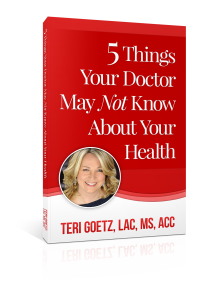 People mistakenly lump herbs in with culinary spices. But herbs are more than just leaves we use to flavor our food. They are also powerful medicine. Herbs contain volatile oils, acids, polysaccharides, vitamins, minerals, and more, all of which pack them with countless health supporting qualities. The fresher the ingredients, the stronger the benefits. Making a tea (or “soup” in Chinese medicine) from herbs and spices generally pulls the powerful elements out of them more strongly than if you were to use them dried or ground.
People mistakenly lump herbs in with culinary spices. But herbs are more than just leaves we use to flavor our food. They are also powerful medicine. Herbs contain volatile oils, acids, polysaccharides, vitamins, minerals, and more, all of which pack them with countless health supporting qualities. The fresher the ingredients, the stronger the benefits. Making a tea (or “soup” in Chinese medicine) from herbs and spices generally pulls the powerful elements out of them more strongly than if you were to use them dried or ground.
This week let’s look at two common culinary herbs, sage and oregano, and see what benefits we can gain from them… aside from great poultry seasoning or something no Italian grandma would ever leave out of her sauce!
Sage (Salvia officinalis)
The adjective “sage” means wise, and the word can also refer to a person of profound wisdom—someone who in many cultures would be a teacher and healer. It has always occurred to me that sage the herb is rightly named, for it is a wise healer in its own right.
Medicinally, sage:
• helps with gastrointestinal issues
• shows improvement in mental illness
• high in antioxidants
• helps with Alzheimers
• improves memory and brain function
• anti-inflammatory
• protects oils from oxidation
Believe it or not, sage is in the mint family, along with oregano, lavender, rosemary, thyme, and basil. It has a long history of medicinal use for everything from mental illness to gastrointestinal issues. Like many of these herbs, sage contains rosmarinic acid, which has been shown to be anti-inflammatory in the gut, especially, as it is readily absorbed.
Sage also acts as an antioxidant. The leaves and the stems (which is why I just throw the whole bunch in the tea) contain antioxidant enzymes, and when combined with the phenolic acids and flavonoids, give the herb a unique capacity to prevent oxygen based cell damage. Because it’s high in antioxidants, sage can help protect the body from free radicals. It has also been studied in extract form and been shown to decrease agitation and increase cognition in early to moderate Alzheimer’s patients. Studies show that it can improve memory in healthy young adults, as well. Pharmacological Biochemical Behavior published research demonstrating clearly improved cognitive function in a double-blind, placebo cross-over study.
If you know anyone with Alzheimer’s, do some research on “dan shen” or Chinese sage. The research has been very strong showing it as a good option to pharmaceutical AChE inhibitors.
Oregano (Origanum vulgare)
Oregano is a gloriously fragrant Mediterranean powerhouse of a culinary herb that even my great aunt, who always cooked from cans, had (dried) in a jar in her cupboard. It has been a “go to” herb for cooks (of all abilities) for centuries. But what Aunt Evelyn didn’t know, and you might not either, is that oregano has amazing healing qualities. It is:
• anti-bacterial
• high in vitamins and minerals
• antiseptic, antiviral, anti-parasitic
• immune stimulating
• high in Omega 3s
• high in antioxidants
• useful for skin conditions
• anti-inflammatory
• calming to allergies
• helpful with menstrual/menopausal issues
Oregano has been getting a lot of press lately for its incredible anti-bacterial quality. It is high in vitamins such as A, C, and E, as well as minerals like zinc, magnesium, iron, calcium, potassium, copper, manganese, iron, and niacin.
For health purposes, it can be used as an oil, but beware of the very strong taste. I usually mix the oil into other things or take it by capsule. The oil is also considered antiseptic, antiviral, anti-parasitic, and immune stimulating. Additionally, oregano oil is high in Omega 3s (which I found interesting), and, like sage, antioxidants. In a study at
Georgetown University1 oregano oil was also found to be a great treatment for drug resistant bacteria and fungus. For example, it can be used for skin conditions and athletes foot in addition to its internal use during infections. One study published in Journal of Food Protection2 found that oregano provided complete inhibition of Listeria, Staph, E coli, Yersinia enterocolitica, Pseudomonas aeruginosa, Lactobacillus plantarum, Aspergillus niger, Geotrichum, and Rhodotorula. Other studies have revealed that it has a positive effect on colitis. And as if all that were not enough… it lessens inflammation, calms allergies, helps with menstrual and menopausal issues, and is a digestive aid.
Is your head spinning? Mine is. If that many health benefits are to be found in just two very common herbs, imagine how great we could all feel if we just boiled some water, steeped some herbs, and sipped away all day. Next week I’ll tell you more amazing, mind-blowing information about some of the herbs in my Powerhouse Tea!
1 http://www.sciencedaily.com/releases/2001/10/011011065609.htm
2 http://www.ncbi.nlm.nih.gov/pubmed/11456186
 Back in the 50s, when the research first showed up about stress affecting the immune system, the medical community started to pay attention. But, they only knew a piece of the story. Since then, we have learned so much more. Current research shows that stress
Back in the 50s, when the research first showed up about stress affecting the immune system, the medical community started to pay attention. But, they only knew a piece of the story. Since then, we have learned so much more. Current research shows that stress
